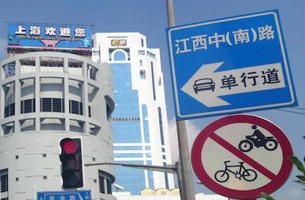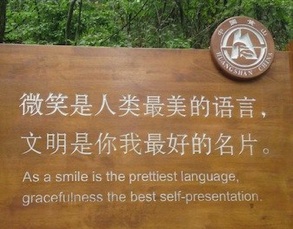The Language









The hardest thing in China (apart from the occasional stomach bugs, getting lost and sheer physical exhaustion), is the language barrier. Although I’ve travelled in Europe and Africa, I’ve always found a way around any language problems. My first inkling of how difficult China might be was actually when I was in Morocco last year - there I was, all sorted with my maps and guide book - until I realised that the street signs were in Arabic - ulp! I found my feet pretty quickly after that, but it’s not just a language problem, it’s an alphabet problem - which means that the best maps are the ones with both English and Chinese on them, and I really couldn’t have survived without mine.
The official language of China is Mandarin, although Cantonese and other dialects are used in many other places. If you can manage a few words of Mandarin I’d be impressed, if you can learn as much Mandarin as you can before you go I am sure you will find it useful (I wish I’d done this!) In certain areas there really is no English speaking, particularly in Beijing and Shanghai - in my sections on these places I will give advice on where to go or how to get around the language problem, but please don’t assume that language won’t be a problem - it was a big problem for me. If nothing please take a decent phrasebook with you. I took the Berlitz one - and it was rubbish - okay I could understand that it didn’t have words like cool, trendy, funky or hip (these are important for shopping in Shanghai) or even party, but water? That’s a word that should be easy to find in any phrasebook.
In Beijing I really struggled, in fact this is the kind of place where, if you see another non-Oriental person in the street, you stop and have a little chat and ask them how they’re doing. (If you’re lucky, like me, and speak English and French you have twice as much chance of being able to have a conversation.)
It feels a little like taunting but they often have English on the cover of magazines here, but when you open them up it’s all in Chinese! I was incredibly glad just to find a German OK! magazine in the hotel in Beijing, at last something I could sort of understand. And the Beijing Time Out I read cover to cover about 5 times - no interest really in the contents, just great to have some English! And I really needed my iPod sometimes just to enjoy being able to understand things for a little while.
I did have my incidents, mainly in restaurants, where I just couldn’t seem to get things across, and in one case a very nice gentleman stepped in and helped smooth it out (but I felt like such an idiot!)
So I would just like to say officially, I am so sorry to all the American tourists that stopped me in the street when I lived in Paris and to whom I pretended to be French because I couldn’t be bothered to give directions. Sorry, sorry, sorry and yes, what goes around comes around!
The tourist information: Don’t get too excited if you see an English sign for a tourist information office as I did in Beijing. I walked in, and didn’t realise why the guys were so amused, until I opened up the leaflets with English on the cover... the contents were still in Chinese. And this place hosted the Olympics?
Useful words: The most useful phrase I find in any language is “hello” - it lets them know you’re trying and gets you off on the right foot. Sometimes it also means they talk to you for 5 minutes before finding out it’s the only word you know, but hey. In Mandarin it’s “nihao” (Like “knee” “how”).
The second most useful phrase in any language is “thank you”. (Can also be used as please.) In China I found myself using this with many gestures, such as touching my heart or even doing my own little bow to symbolise profound thanks, or sometimes just saying it about five times in a row. In Mandarin it’s “xie xie” (“she she”).
“Goodbye” is less useful, but you know, nice to have. It’s “zai jian” this is the one I picked up just from people saying it to me. (Pronounced like “sigh” but with a “z” and then “gee” “an”).
My killer phrase - so useful, is “mei li”. This means “beautiful”, and you can use it for many, many things. The best response was from Mr Wu Senior in Huangshan, when I called his car “mei li” - happy man! You can also use it for food - everyone loves a compliment. Your room at the hotel... “mei li”, the scarf you are trying to barter for - “mei li” with a shrug but you only want to pay 10 yuan, best of all when you see a family and the kid is pointing at you because you’re not oriental, “mei li”, the parents will adore you, if you are up a mountain and trying to converse with a little old Chinese man, gesture to the view “mei li”, even your massage, “mei li”. (Pronounced “may” “lee”.)
If you’re wondering why I don’t have yes and no at the top of the list, well “yes” is “shi” which I am not sure how to pronounce, so I tended to just say “xie xie”. “No” is “bu” or “bu shi” depending on which phrase book I was looking in, and you mainly only say this to people hassling you for stuff so it doesn’t work anyway. I found shaking my head much easier.
Oh, and how could I forget my Chinese word taught to me by those massage ladies. The word is “tong”. Initially I thought it meant knee, because this lovely reflexology lady was pointing at my go-kart injuries and saying tong - then when I went for a little cupping (ouch!) the woman kept saying tong. So in the end I got off the bed and found my phrasebook. It means “pain”. Sad to say this was one of my most used phrases in China. And most heard words, as every time a masseur touched my legs after I came down the mountain they would shake their head and say “...tong...”, I would nod sagely and repeat “yes, tong” - we understood each other.
Information as at September 2010
Street signs in Shanghai - this is probably why they don’t let English people drive

A wonderful saying on Huangshan
Pearl Escapes.
Learning the meaning of the word “tong”...
so you don’t have to.








